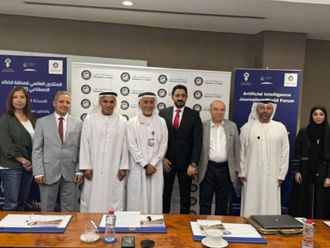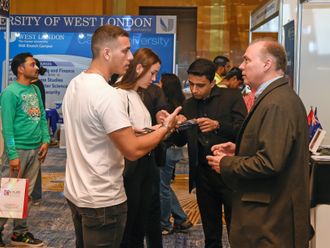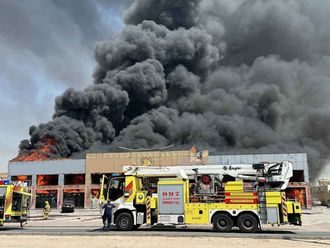
International schools and universities, cutting-edge education strategies and the latest courses on offer mean those studying in the UAE are more job-ready than most. And they stand to benefit further from the country’s increasingly globalised work atmosphere.
"In numerous ways students in Dubai are incredibly lucky, most notably in terms of the diversity of cultures, social tolerance and the entrepreneurial spirit of the country’s leadership. One can acquire a genuine and coveted global mindset without ever leaving the UAE," says Brad Boyson, Executive Director, Society for Human Resource Management (SHRM), MEA.
Preparing job-ready graduates has become a goal for universities. In the current economic climate it is even more important — universities and colleges are increasingly proactive in ensuring their graduates are immediately employable.
"International branch campuses and regional universities located here are able to respond to regional job needs and are best placed to meet the needs of the regional marketplace. And with more information on employer needs there will be increased graduate employability," says Sajida Shroff, a Dubai-based consultant working in educational strategy, private equity investments and quality compliance.
Interest matters
How job-ready, or indeed, life-ready, a graduate is often depends on the course of study. As a rule, students respond better to a course they want to study. Boyson says: "The demand for almost any skill is only sustainable if the person has a genuine passion to apply it. Therefore, the key to having skills that are in demand is threefold: first, recognise your passions, second, invest in those passions, and third, never forget to self-promote your passions. Addressing the last point, one needs to be sure about understanding the difference between skills that are in demand for their economic value and skills that are supplied for their intrinsic or personal value. "Don’t assume that there is a market for your passions, but finding a way to meet the market half-way is a good general strategy for personal engagement, job satisfaction and economic reward."
Ahmed Ali, Director of Recruiting and Marketing, Middle East and North Africa, Hult International Business School, says some sectors are hiring more than others.
"The Middle East is recovering very well. We have seen very positive signs in the employment market. Industry functions such as sales, business development and human resources are growing due to growth in the real estate, oil and gas, hospitality, FMCG, telecommunications and transport and logistics sectors," says Ali.
As the economic climate changes, sectors traditionally considered lucrative may no longer be so. "Prior to the global downturn, sectors such as real estate and banking were in high demand. Since the recession, there has been a significant drop in demand in these sectors — banking in particular losing its perception of job security," Boyson adds.
"Hospitality and retail continue to see strong tourism-related employment demand. Though perhaps not perceived as prestigious or as high-paying, these sectors are excellent training grounds for introducing valued work habits, especially experience gained within the larger, more established international organisations. Brand-recognised global organisations, though not really a sector per se, are consistently sought out by job seekers."
Shroff points out that regional differences may mean sector growth is not universal. "Sectors that hire the most regionally are banking, finance and IT. Sectors that are growing include social media, the arts and logistics," she says.
Colleges and universities are better geared towards providing education for specific jobs. "Hult’s Leap teaching method is designed to prepare students to hit the ground running when entering the job market. Students learn through classroom interactions and up-to-date course material, gain experience from faculty members who are working professionals, and through experiential action projects, which are consulting projects for leading companies and non-profits. The Leap method is an integrated approach to learning, which gives our graduates the job-ready skills that employers are seeking," says Ali.
A global UAE
In many ways, the UAE is the best place for a new graduate. Internationally, it is a sound economy, and regionally, its safe haven status is very attractive to companies choosing it as a hub. But this means the region is attractive to others as well. "The emerging economies continue to offer interesting opportunities for new graduates. Global competitiveness is now a critical factor as graduates from the emerged economies are more open to moving here thus directly competing with regional graduates," says Shroff.
A part of the global world, new graduates are more willing than ever to relocate. "Close to 60 per cent of Hult graduates are employed in countries outside of their home country, which reflects the international ambition of our students," says Ali.
Experience counts
It helps if students opt for courses they are ready for. Many opt for a professional degree after gaining some experience so they know exactly where they are going. "For instance," says Ali, "Hult’s MBA candidates must have previous work experience of six to seven years. However, the Master of International Business degree, a lighter version, is designed for fresh graduates who have less than three years of work experience. Hult’s other master’s programmes — Master of Finance, Master of International Marketing and Master of Social Entrepreneurship — have a healthy mix of recent graduates and experienced candidates."
Experts do caution against students assuming that their global and cultural intelligence automatically prepares them to live and work elsewhere.
Boyson says, "The UAE is atypical and many people who have never lived and worked in a country with income or corporate taxes can find it difficult to plan and manage accordingly. This is especially challenging for students who study business in the UAE, where they don’t have the opportunity to experience first-hand just how much taxation affects decision-making by businesses."












